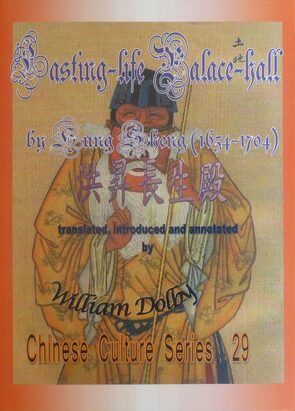29. Lasting-life Palace-hall by Hung Sheng (1654-1704)

Book Details
"Lasting Life Palace-hall by Hung Sheng (1654-1704)", translated by William Dolby. Originally self-published in a hard-backed A4 sized edition in 2010, the basis of the work and the original translation were conducted much earlier during the 1980's to 1990's.
Now available in paperback, 2016
Volume 1, The Translated Play
|
Volume 2, Endnotes and Appendices
|
This work represents the 29th of 33 of the Chinese Culture Series.
Please contact us on availablity of this work
The monumental Chinese stage drama Lasting-ilife Palace-hall (ch'ang-sheng tien) by Hung Sheng (1654-1704) is one of the most famous and seminal Chinese works.bIts topic is the romance between a T'ang dynasty, 8th century AD, emperor and his empress, she being vividly regarded as China's outstanding femme fatale, his love with her having led to the breakdown of the dynasty.
Their tale is one of the three or four most celebrated love romance of Chinese tradition. The play would take days to perform in its entirety, but has spawned various short excerpt-dramas. It is a complex mix of complexities, lyric, powerfully descriptive, occasionally humorous and even bawdy. A major artifact of Chinese, and, indeed world, literature and entertainment.
Futher details about the book:
Lasting-life Palace-hall, like many earlier plays and other writings, concerned the love affair of Emperor Shining August-emperor of the T’ang and Yang Jade-bangle (Yang Yu-huan), who became his Most-prized-empress (Yang Kui-fei). It was much longer and more elaborate than any earlier drama on the same theme, and had fifty acts. Unlike Pai P’u’s (AD 1226 – AD?) Rain on the parasol-tree (Wu-t’ung yü), it doesn’t limit itself to Empress Yang’s death and the emperor’s sorrowful memories of her. From Act Twenty-six onwards, she frequently reappears as a spirit. She sees her scheming relatives carried off to Hell. The grieving emperor has a life-size image of her carved in precious wood. Meanwhile in the capital, after an unsuccessful assassination attempt by a loyalist musician, the adopted son of the rebel An Lu-shan murders Lu-shan. T’ang armies restore the empire, and the emperor returns to the capital. On his way, he reaches the spot where Empress Yang lies buried, and orders her exhumation for reburial. The grave is empty but for her perfume sachet. A woman brings one of Empress Yang’s silk stockings to him, and these two mementos renew his sorrow. Back in the capital, he engages a Taoist necromancer to try and contact Empress Yang’s spirit. With the collusion of sympathetic gods, and the help of the Taoist, the two lovers meet once more, the Taoist conjuring up a bridge, and the emperor journeying to the moon to re-join Empress Yang. Already deities in a previous existence, they are now restored to Heaven and reunited in their love for vast time.
The play’s superbly free in its imagination, and much of it is one ornate lyric poem to love. Hung Sheng took immense care in polishing it and in expunging some of the spicier love scenes to shift the emphasis to a dancing scene. Later, feeling that this weakened the love element, he revised it once more. Only after a third major revision did he settle its form and title. A music master added his expertise to Hung’s enormous knowledge of music for the songs.
Although the play has a happy ending in the Chinese tradition, the element of personal and political tragedy looms large in the workings of the plot.
Other known translations of the original title are 'Abiding-life Palace-hall, Palace of Eternal Youth and Palace of Eternal Life with Hung Sheng being otherwise known as Hong Sheng.
List of Books in the Chinese Culture Series
- Kuan Han-Ch'ing: China's first Playwright
- Bring on the Wine and other Poems by Li Pai
- Chinese Poetry Through The Ages: an Anthology
- Chinese Short Stories - Spanning 2000 Years
- History of early Chinese Ch'ü-aria Poetry
- Sayings of Confucius and his Students
- Ma Chih-yüan's Complete San-ch'ü-aria Poems
- Wang Shi-Fu, Author of China's Most Famous Play
- West Wing Chantefable by Tung Chieh-yüan
- Sir Old, the Chinese Classic of Taoism
- Peking Opera
- Yüan Dynasty Variety Plays
- Mr Ma and son in London
- Songs Classic: China’s earliest poetry anthology
- Classical Chinese textbook
- Three Hundred T'ang Dynasty Poems
- Yüan Dynasty Variety Play dramas: 100 stories
- Chinese Folk-tales
- Chinese Humour: an Anthology
- Gold-producing Mansion
- Chinese Riddles
- Chinese Elliptical Idioms (hsieh-hou-yu)
- West Wing, China's most famous drama
- Washing Silk, a drama by Liang Ch'en-yi (1520-ca.1580)
- Chinee Drama Poems
- Chinese Prose: Biographies, Prefaces, Anecdotes ...
- Chinese Myths
- Chinese Prose: Biographies, Prefaces, Anecdotes ...
- Lasting-life Palace-hall by Hung Sheng (1654-1704)
- Chinese non-drama aria-poems, an anthology (VOLUME ONE)
- Chinese Poetry Through the Ages
- Dictionary of Chinese Idioms, Proverbs and Sayings
- Anthology of Chinese non-drama aria-poems (VOLUME TWO)
